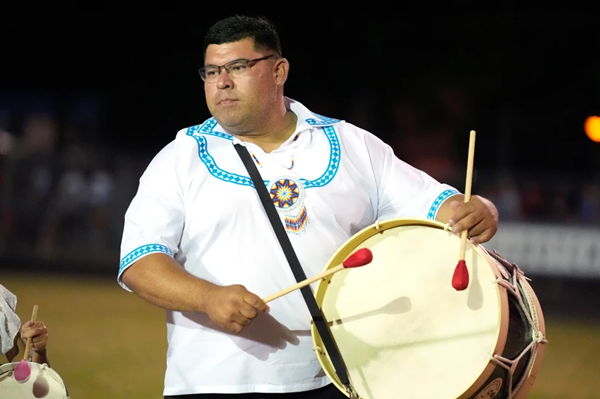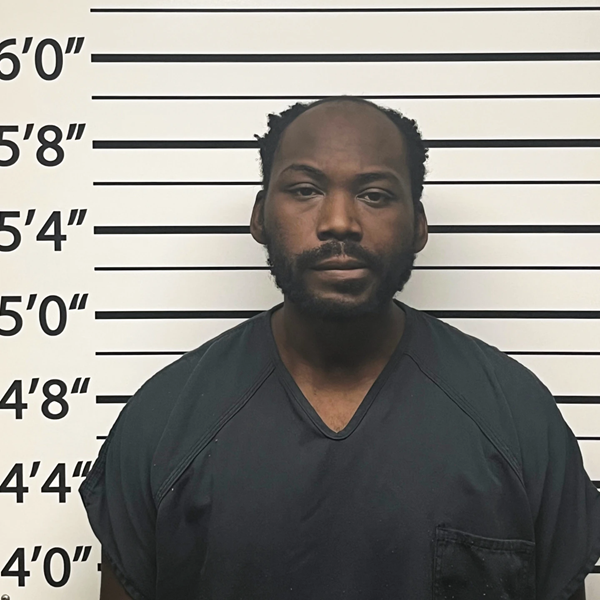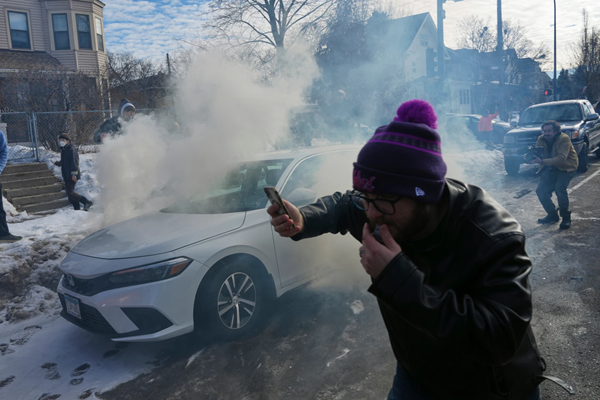Mississippi Choctaw dictionary project helps tribe preserve language

The United States government removed Jason Lewis’ ancestors from Choctaw tribal land twice. The family had left Mississippi more than 200 years ago, when the federal government forced most of the Choctaw Nation to relocate to Oklahoma after pressuring tribal leaders to sign the Treaty of Dancing Rabbit Creek in a clearing in Mashulaville on Sept. 27, 1830.
Chief Pushamataha had spent years in negotiations with the government for compensation for the theft of Choctaw land. But when the chief died suddenly in 1824 during a lobbying trip to Washington, the government’s consistent pressure won. The tribe lost nearly all of its land and 90% of the state’s Choctaw population was forced to march west on the Trail of Tears, enduring food shortages, disease and death.
The government moved Lewis’ family again from their home in Oklahoma to California in the 1940s as a result of the federal relocation program.
Lewis’ father was the first in the family born in California.
“I was born in Los Angeles, (but) I’ve always known that I’m Choctaw,” Lewis told the Mississippi Free Press on Nov. 3. “My dad, you know, always kept that part of my identity present, but his father was the last person in our family to speak the language. It wasn’t passed on to my dad.”
Lewis became interested in learning the language. At 21, he listened to recorded lessons in the language but still found it challenging to grasp it. In 2009, he decided to move to Mississippi.
“I knew that (this is) the only place where (the language) actually exists, spoken every day,” Lewis said. “I can go to the grocery store near here. I can go to a church. I can go to the government office, and somebody is going to be speaking the language there. That’s only possible in Mississippi. So that’s why I moved here, to start learning the language.”
Lewis now works in cultural content development with the Mississippi Band of Choctaw Indians’ Choctaw Tribal Language Program’s Department of Chahta Immi.
“Now I’m helping keep it alive for future generations, and it’s pretty cool,” Lewis said.
Mississippi’s only federally recognized Indigenous tribe unveiled a new online language resource in early September. The Choctaw Dictionary Project “is a digital resource designed to support language learners of all levels and encourage more daily use of the Choctaw language, both in the workplace and at home.” The dictionary includes more than 5,000 words, but it goes beyond mere word lists and definitions. It also includes both recorded and translated stories and histories.
‘Over 200 Years, A Lot Can Happen’
Driving through the dense pine trees in the eastern region of the Magnolia State, or in the flat plains of the Mississippi Delta region, motorists encounter many signs they recognize are not common English. The state has many towns and counties whose names are derived from the Choctaw language, like Tupelo, Oktibbeha, Tougaloo and far more.
Many similar words can also be found in southeastern Oklahoma, where the Choctaw Nation of Oklahoma resides today after relocating there on the Trail of Tears with those remaining behind forming the Mississippi Band of Choctaw Indians. Printed language materials that exist today are now considered “old Choctaw” or Oklahoma dialect because the Choctaw ancestors who were forced to march on the Trail of Tears to Oklahoma brought the language of the time to the old Indian Territory.
Jason Lewis said that before this project, no one had documented the language of the descendants of the Mississippi Choctaw who resisted removal in the 1830s. During the removal, missionaries who were trying to record the language followed tribal members to Oklahoma. There, they published two or three dictionaries between 1850 and 1915, he said. However, that language varied from the traditional language spoken in the Magnolia State.
“The Oklahoma Choctaw have had a writing system since 1815. But basically, the Mississippi Choctaw (language) did not get written down, and it has evolved since 1830,” Lewis told the Mississippi Free Press on Nov. 3. “You know, over 200 years, a lot can happen. A lot can change. It’s very difficult for speakers today in Mississippi to find the words that they say represented in the dictionaries of the past.”
Since 2019, the Tribal Language Program’s Department has been working to collect stories, develop a consistent set of symbols to represent sounds, and define a system for spelling the various tenses and meanings of similar words.
Choctaw Tribal Language Program Director DeLaura Saunders said preserving the language is important with the youngest members of the tribe not using or hearing the language daily.
“So part of our mission is to make sure that we provide language resources, provide this online dictionary, and provide story books or language recordings so that they (will) be able to hear and pronounce the sounds of the chapter language,” she said.
‘The Voice of the Ancestors’
Mobile-Washington County Band of Choctaw Indians and American Indian Movement Alabama Treasurer Melissa Weaver said she is excited to see another resource that would help with the tribe’s project of establishing a school for Indigenous children of Alabama. She said it would include cultural exhibitions and lessons for those wanting to learn the languages of the tribes that lived in the southeastern region, including Choctaw.
“I’m excited that it will be available to our Choctaw students attending AIM School for Indigenous Children next fall,” Weaver said in a Sept. 24 statement.
“Our Chahta Annopa (Choctaw Language) is a living tradition of who we are as a tribe, and with it, the voices of our ancestors,” Weaver continued. “Speaking Chahta is not just about communicating or conversing; it is a way of honoring our homelands and carrying forward the resilient Chahta legacy.”
The National Endowment for the Humanities awarded the MBCI a grant in 2020. The grant was a significant boost to the project. However, as the department was nearing completion of the dictionary, the Trump administration terminated the $17,000.
“We were unable to archive the interviews and transcriptions because that funding was canceled,” Jason Lewis said on Nov. 5. “Nor were we able to pay for the final website launch, which was supposed to include a voice search function, trained to recognize Choctaw. So, we are still seeking funds to archive the project outputs and pay for the completion of the website.”
He told the Mississippi Free Press that the tribe is working to raise $10,000 to apply as a cash match to a $20,000 grant from the Mississippi Humanities Council’s America 250 Mississippi Grants program, due on Feb. 1, 2026. Lewis said the Choctaw Tribal Language Program can accept donations at P.O. Box 6010, Choctaw, MS, 39350.
The tribe plans to continue to add words, interviews and stories to the resource as funding allows. The department is continuing to transcribe interview recordings, stories and add accumulated words.
MBCI Tribal Chief Cyrus Ben highlighted the depth and importance of the Tribal Language Department’s work in recording the language.
“Our language is not just a means of communication; it is the living spirit of our identity, our stories, our traditions, and our connection to the land and ancestors,” he said in a Sept. 8 statement. “Preserving the tribal language is vital to preserving who we are as a people.”



